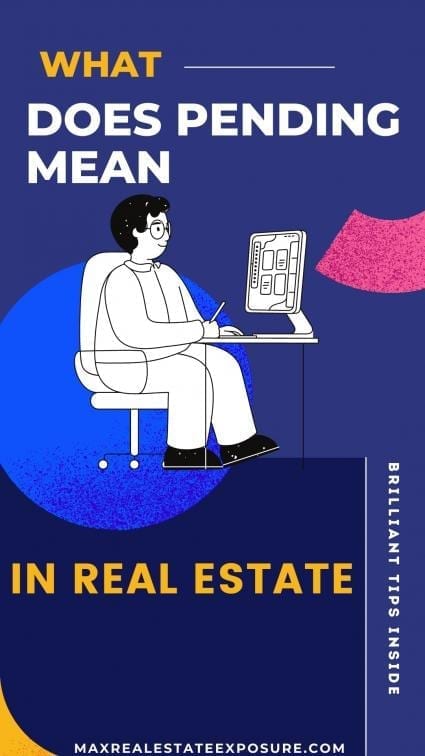 Over my thirty-eight-year career, many buyers and sellers have asked me what pending in real estate means.
Over my thirty-eight-year career, many buyers and sellers have asked me what pending in real estate means.
It is not unusual, as many real estate terms are batted around, assuming all consumers should know them.
Real estate agents use similar terms with similar meanings, including under contract, under agreement, pending sale, and offer accepted.
No wonder there can be some uncertainty with the definition of pending.
Many homebuyers might have been hoping for a let-up in the real estate market going into 2024, but things have gone in the opposite direction.
With homes not staying on the market for long, buyers must hurry to get the home of their dreams.
If you find a home that you like, it can be annoying, to say the least, to see the listing change.
But what does it mean, and how will it affect your search for a new home?
It is essential for buyers and sellers to understand various listing statues that are found on MLS and popular sites like Zillow and Realtor.com.
The listing status can impact buying and selling decisions.
Let’s examine everything you should know.
What Does Pending Mean in Real Estate?
Pending means you are waiting for the conclusion of some event to occur.
When a property is listed with this status, the buyer’s contingencies have been met, and they are getting ready to close on the home.
With pending real estate, you can’t offer a higher amount to the seller. It’s too late. The transaction is waiting on the settlement at this point.
Let’s look at everything a buyer and seller need to know about this listing status.
How Do Home Listings Go From On The Market to This Status?
You might be wondering how active listings become pending listings. When listings enter the multiple listing service (MLS), they start as homes for sale.
Any prospective buyers who want a home can peruse home listings at their leisure. Numerous real estate websites are fed all homes from the local MLS.
Home buyers and sellers can look at homes for sale at their leisure.
Of course, potential buyers do this in hopes of finding their dream home. Some home buyers will look at online listings daily to avoid missing a property that hits the market. These resources allow buyers to search for properties in their desired area.
Once an offer is accepted on a property, the listing agent will change the listing status in the multiple listing service.
Changing the listing status in MLS will also alter the status to pending in sites like Zillow, Realtor.com, and other popular real estate sites.
Listing Statuses Often Go From Contingent to Pending
Status changes must be made in MLS when there is an accepted offer and both parties execute a contract. Seller’s agents have a few options when changing the listing status. A listing agent could mark the property as active contingent or pending sale.
The contingent status is quite common as most transactions have common contingencies to get through, such as the home inspection contingency, appraisal contingency, and financing contingency.
Most experienced real estate agents expect a contingent offer unless the market heavily favors home sellers. If bidding wars occur, there will be fewer contingent deals as buyers try to one-up one another.
So, when someone asks what contingent means, you will know that things must be completed before the transaction goes through. A contingent listing will move to the pending stage when all contingencies are removed.
Understanding the Differences Between Contingent vs. Pending
 You might notice some listings marked contingent, but what does that mean? How does pending status differ from contingent status?
You might notice some listings marked contingent, but what does that mean? How does pending status differ from contingent status?
As previously mentioned, contingencies are clauses added to the buyer’s offer that allow them to back out of the offer they have made with their earnest money returned.
Contingencies are often added to real estate contracts related to home inspections, home appraisals, mortgage approvals, the buyer selling their current home, short sale approval, and more.
Buyers can request contingencies. If the seller accepts this as part of the offer, it is a contingent sale.
The seller still can’t accept another offer, though the buyer can leave the deal if the contingency terms aren’t met.
Contingencies are more commonly used in a buyer’s market where sellers are more likely to agree to keep the buyer happy.
In a seller’s market, buyers may have to give up these safeguards that protect their earnest money in escrow.
When sellers are in a position of power with multiple bids, they might only consider offers with no contingencies attached to them.
When comparing contingent vs. pending sales, both statuses mean the seller has accepted an offer.
A contingent sale will move to the next stage once the contingencies have been fulfilled. In some places, the status is referred to as active contingent.
If the terms of the contingency are not met, the sale can be canceled, and the buyer will have their earnest money deposit returned to them. This deposit is sometimes referred to as a good faith deposit.
Earnest money is often between 1% and 5% of the sale price.
Sometimes, a listing agent will move a home into pending status before all the contingencies have been satisfied.
Why Change a Listing Status With Open Contingencies
You may wonder why an agent would change a home in the multiple listing service to this status if there are open-ended contingencies left to satisfy.
In many places, when you mark a house as contingent, the days on the market continue to increase as if the home were still for sale.
If, for some reason, the current buyer backed out of the contract when put back on the market, there would be inflated days on the market.
It would seem like the home was on the market for a long time, which is not great for sellers. When you change a property to pending, the days on the market do not continue to grow.
So, it boils down to the type of contingency left to satisfy. For example, if you are reasonably sure the mortgage lender will grant financing approval, changing the status to pending would be a good idea.
By doing so, the days on the market will be frozen.
If the buyer gets cold feet and backs out at the last minute, the market time will not be unnecessarily inflated. Changing to this status is best when you are confident the purchase agreement will be satisfied.
Can You Still Make an Offer on a Sale-Pending Listing?
Most of the time, making an offer when the sale has an executed contract isn’t worth the trouble, especially when you need to find a place to live.
The seller usually can’t accept even if you want to offer more for the home. An under-contract sale means the buyer’s due diligence has been done, and the final step is waiting for the closing date.
Unfortunately, the current contract must be honored, and the seller cannot accept a better offer. You may not like this situation as a buyer, but it will benefit you when you have a real estate deal in place yourself.
You wouldn’t want to have your offer accepted only to continually worry about someone coming along with a higher offer.
Submitting an offer on the sale is possible, but it will only be treated as a backup offer. The seller will not consider your offer unless the deal falls through with the first buyer. For this reason, making an offer on an unsettled home sale is often not advised if you’re under a time crunch.
When you have lost out on a house you want and don't have a 2nd choice, you may want to consider writing a backup offer.Click To TweetWhat is a Backup Offer?
You may be wondering what a backup offer is. Backup offers are made on properties, hoping the original buyer doesn’t proceed with the transaction. The home-buying process doesn’t always go smoothly.
There are several reasons why a home sale could fall through. A home inspector finding significant issues to a home loan being rejected are all potential reasons; a home seller could see their home back on the market.
A backup offer will allow you to be in a position to move forward with the sale should this happen.
How Often Do These Properties Fall Through?
 Over my thirty-seven-year career, many buyers have asked me whether homes in this status fall through.
Over my thirty-seven-year career, many buyers have asked me whether homes in this status fall through.
Under contract home sales sometimes fail, but it doesn’t happen often. As little as 4% of these sales fail to close, with the home returning to the market.
Sales in this status can fall apart for several reasons, including the following:
Financing Failures
Most homebuyers need a mortgage, and things can sometimes go wrong even if they are preapproved for a loan. If the buyer’s financial situation changes between preapproval and closing, they may not get final approval for the loan.
Now and then, a buyer’s credit score could change for the worse, creating a mortgage rejection from lenders. Anything can happen when bank loans are involved.
In some cases, everything goes smoothly, and something negative happens after the application.
One of the common issues is when buyers take on additional debt.
Appraisal Problems
Particularly in competitive real estate markets, bidding can drive prices up. But when the home is appraised, the market value might be lower than the offer price. This can prevent the lender from loaning the total amount necessary to continue with the purchase.
The sale could fall through when the home appraisal is low, and the buyer doesn’t have additional down payment funds. The mortgage contingency would allow the buyer to withdraw from the sale.
In hot markets, it is not uncommon for a top Realtor to ask for an appraisal contingency removed when the sale price is way over asking.
Great seller’s agents do what’s necessary to protect their client’s interests.
Inspection Findings
While it is unusual for a home inspection to find nothing wrong, more significant issues could halt a buyer’s purchase. There may be considerable work needed.
Given the condition, a buyer may wish to negotiate after the inspection. Sometimes, a reduction in the purchase price is asked for and rejected.
A home buyer may sometimes ask for repairs, a seller’s concession, or a closing cost credit. Sometimes, different terms cannot be agreed upon by the parties. The original contract will fall apart if the homeowner refuses the buyer’s requests. This will open the door for new buyers.
Title Problems
It is possible the title search could reveal unexpected problems that could impact getting to the closing table in a timely fashion. A clear title is a type of contingency in all real estate contracts.
The sale could fall through if the title issue cannot be fixed in an agreed-upon time frame.
Having Second Thoughts
Buying a house is a significant life decision, especially for first-time home buyers. Occasionally, a buyer will change their mind. Home buying is an emotional experience, and occasionally, buyers can have a change of heart. Agents call this a case of buyer’s remorse.
Buyer’s remorse can become even more prevalent when a purchaser has been involved in a bidding war and realizes they may have paid too much.
Can Agents Still Show These Homes?
While this is possible, as the home is still on the market, there isn’t much point. Since the sale is unlikely to fall through, Realtors are unlikely to bother the seller to show a home that already has a buyer.
In any case, the seller is unlikely to consent to have their home shown to another potential buyer.
How Long Will a Home Be Listed With This Status?
If you have set your sights on a home now under contract, how long before you know the house is sold? It can take anywhere from about a week to a couple of months for a home to move to the closing.
The average time to close is between 45 to 60 days. All the stages in the home purchase need to be completed in this time frame, including title checks, home inspections, and mortgage approvals.
So, most houses stay under contract from four to eight weeks.
Why Would a House Be Unresolved For So Long?
Occasionally, the closing of a house can be held up. There could be several reasons why. The buyer may be having trouble getting financing. There might also be title problems the seller needs time to fix.
Under such circumstances, closing extensions occur, and the property remains held in this status.
Does This Listing Status Mean No Contingencies?
Yes. Typically, when no contingencies are left to satisfy, a real estate agent will change the listing status to pending.</p></p>
How Common Is it for Sales to be Under agreement?
Many different factors increase or decrease the likelihood of a pending sale. How active the market is affects the chances of selling fast, and things like the time of year also influence it.
If a home is priced correctly, it will eventually reach this status. Sometimes, a lower price is necessary for that to happen.
When a significant amount of time goes by in the selling process, owners eventually realize their homes won’t sell without a price adjustment.
7 Common Questions About Listing Status Changes
1. How Soon Can an Offer Go From “Active” to Pending Once an Offer is Made?
In the fast-paced world of real estate, the transition from an “active” status to under contract can vary depending on several factors.
Typically, once an offer is made on a property, it undergoes a thorough review process by both the buyer and seller’s respective parties. This includes evaluating the terms and conditions of the offer, conducting necessary inspections, and finalizing any required paperwork.
While there is no fixed timeline for this process, it generally takes 24 hours to a few days for a property to go from “active” to “pending.” However, this transition may take slightly longer when multiple offers are received simultaneously, or negotiations take longer than usual.
 1. What Does Active Under Contract vs. Pending Mean?
1. What Does Active Under Contract vs. Pending Mean?
In both circumstances, a buyer has submitted a contract and accepted it by a seller. The seller has requested that showings on the home continue until all of the buyer’s contingencies have been lifted with the active under-contract status.
There may be some fear on the seller’s or listing agent’s part, whereby they think there is an elevated risk that the sale will not close.
See a complete explanation of active-under contract vs pending</a&gt;.
2. What Does Active Kick Out vs. Active Contingent Mean?
An active kick-out clause is when a buyer has a house under contract with a seller, but there is a provision that states the buyer only needs to purchase if they sell the home they currently own.
The seller can continue to market the home. If another buyer comes with an acceptable offer, the first buyer would either need to remove their home sale contingency or pass on the house and get their money back.
Active contingent means that contingencies have not been satisfied, and the home is still being marketed in case the sale falls through.
3. Can You Buy a Home Under Agreement?
To be able to buy a house that is under contract, the sale would need to fall through first.
If you love a particular property, it might make sense to submit a backup offer in hopes the sale falls apart. It is undoubtedly possible for under-contract sales to come back on the market.
Houses come back on the market after being under contract in some circumstances.
4. What is The Difference Compared to Under Contract?
There is no difference – they mean the same thing.
5. Can You Outbid a Pending Offer?
No, you cannot. There is a binding contract in place. Additional offers can be made but not accepted by a seller.
6. Does It Mean The House is Sold?
No. A home does not become sold until papers pass at a closing and a new deed is recorded at the local registry of deeds.
7. What Steps Can Sellers Take to Expedite The Process?
To expedite the process, sellers can take several proactive steps. First, they should ensure that all necessary documentation is prepared and organized in advance, including property title deeds, inspection reports, and any relevant permits.
This will help streamline the transaction and prevent delays due to missing paperwork. Second, sellers should promptly respond to requests or inquiries from the buyer’s agent or lender, providing any additional information or documentation required.
Precise and efficient communication is critical to keeping the process moving smoothly. Additionally, sellers can consider offering incentives such as a flexible closing timeline or covering certain closing costs to entice the buyer to move forward quickly.
Compelling Research Statistics
Final Thoughts
By now, you should completely understand what the status means. Knowing the different listing statuses is essential whether buying or selling a house.
Hopefully, you now have a better handle on the ins and outs of the common listing statuses. The bottom line is the transaction is not completed until the fat lady sings.
About the Author: The above Real Estate information on what pending means in real estate was provided by Bill Gassett, a Nationally recognized leader in his field. Bill has expertise in mortgages, financing, moving, home improvement, and general real estate.
Learn more about Bill Gassett and the publications he has been featured in. Bill can be reached via email at billgassett@remaxexec.com or by phone at 508-625-0191. Bill has helped people move in and out of Metrowest towns for the last 37+ years.
Are you thinking of selling your home? I am passionate about real estate and love sharing my marketing expertise!
I service Real Estate Sales in the following Metrowest MA towns: Ashland, Bellingham, Douglas, Framingham, Franklin, Grafton, Holliston, Hopkinton, Hopedale, Medway, Mendon, Milford, Millbury, Millville, Natick, Northborough, Northbridge, Shrewsbury, Southborough, Sutton, Wayland, Westborough, Whitinsville, Worcester, Upton, and Uxbridge MA.


 1. What Does Active Under Contract vs. Pending Mean?
1. What Does Active Under Contract vs. Pending Mean?